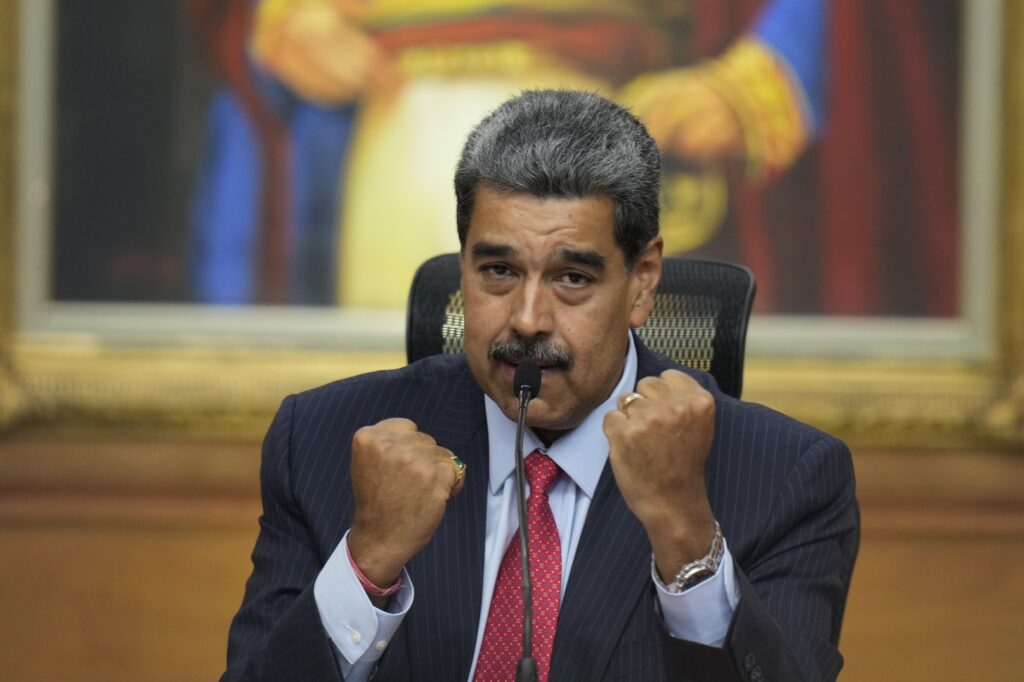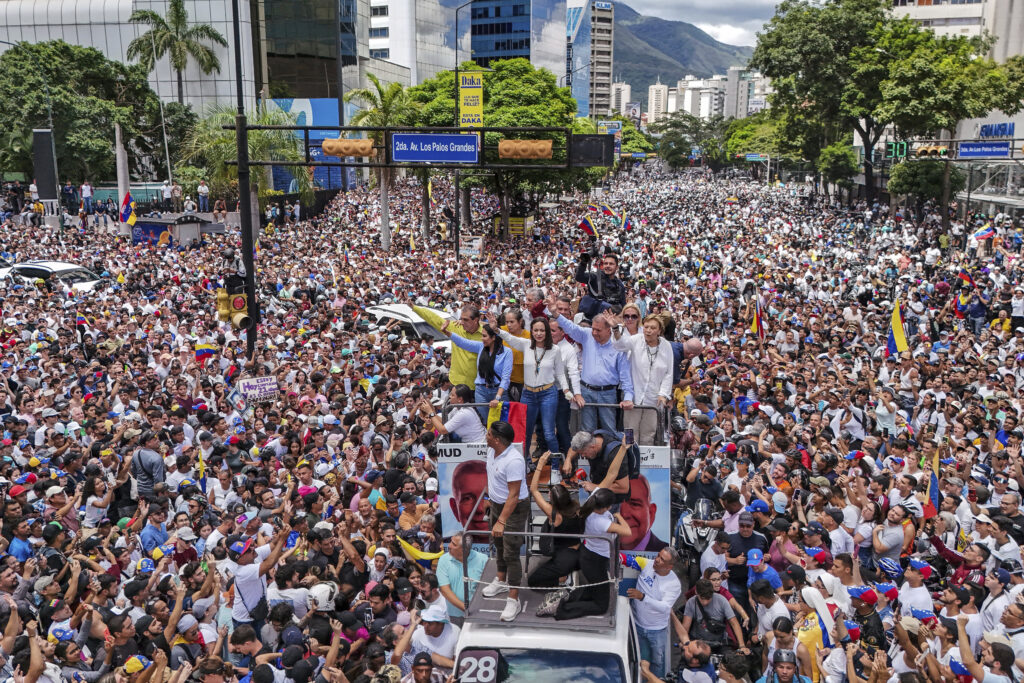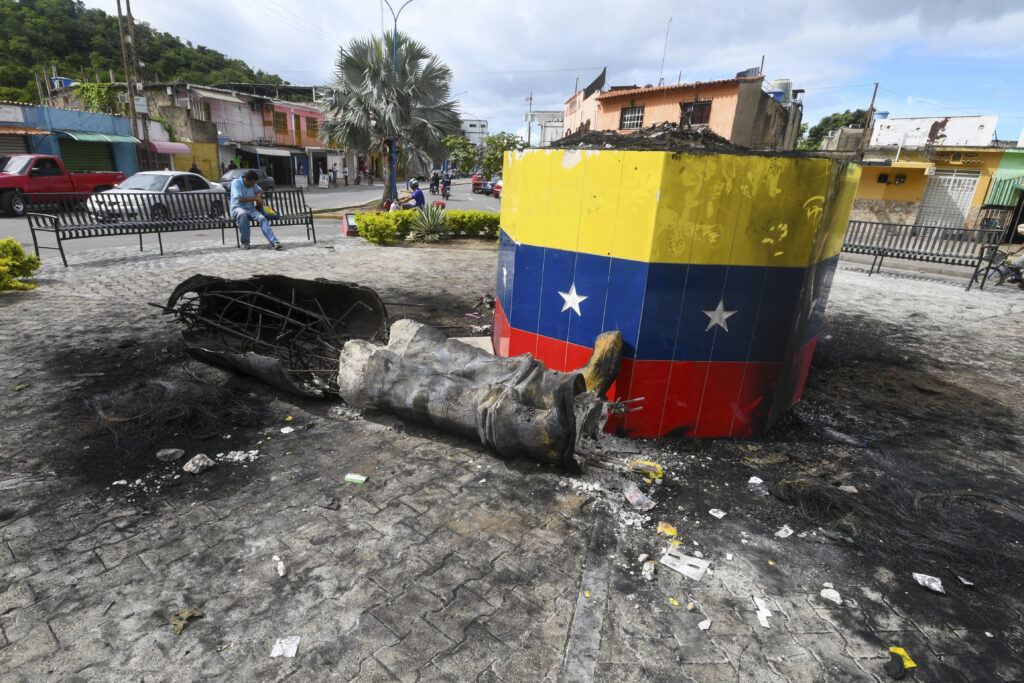Venezuelan Dictator’s Shoot-To-Kill Order Will Push More Migrants to America — in Full Election Season
Maduro blames ‘international Zionism’ for the troubles besetting Venezuela.

Venezuelan dictator Nicolás Maduro told military brass and soldiers yesterday that his government is “pulverizing an attempted coup.” Reviewing Bolivarian National Guard troops, equipped with rifles and riot shields, he vowed: “I am willing to do anything.”
Mr. Maduro spoke a week after a presidential election that independent analysts and exit polls indicate that he lost by a margin of one to two. One analyst calls Mr. Maduro’s claim to win the election the largest fraud in Latin American electoral history.
Mr. Maduro’s appeal for violent suppression of the opposition goes beyond giving a hunting license to Venezuela’s myriad security forces. It speaks to his insecurity over the unity of the military. Beyond that, he frets about loss of support in the working class neighborhoods that provide recruits for the military.
For at least a century, Venezuela’s military have been the ultimate arbiters of political crises. Mr. Maduro often dresses in khaki or olive green. Yet he never served in the military. Unlike Chile’s Augusto Pinochet or Cuba’s Fidel Castro, he has no natural military base.

Instead, under Cuban instruction, he has created competing military forces and competing military intelligence agencies. He has rewarded top officers with salaries, monopolies, and businesses, giving them incomes they could never dream of seeing in civilian life.
The rank and file are motivated by patriotism, esprit de corps, and a steady paycheck in an economy that shrank by 72 percent during the Maduro decade. However, these soldiers do not live in a vacuum.
Over the last week, there were reports from Tachira, a state bordering Colombia, of National Guard units siding with protesters. In another report, 70 manacled policemen were paraded before their colleagues.
Their “treason”? Refusing to crack down on protesters. Yesterday, the leader of a heavily armed criminal gang, Tren del Llano, posted a video threatening police and soldiers: “If you repress the people, we are coming out.”

To stiffen spines, Cuban special forces reportedly have arrived. One photo, ostensibly from Havana’s airport, shows armed soldiers climbing stairs to board a jet operated by Conviasa, Venezuela’s state airline.
Voting return analysis shows that working class barrios that once gave between 80 percent and 85 percent of their votes to the revolution turned last Sunday against Maduro.
In one of many striking videos to emerge from poor neighborhoods, a pickup truck slowly drags a toppled statue of Hugo Chávez, founder of the revolution. Behind the truck stretches a quarter mile long celebratory procession of motorcyclists and jogging young men. Passersby standing on a sidewalk make cellphone videos of the festive affair.
Reporters who have gone to Caracas jails to interview relatives of detained protesters say the large majority were from working class neighborhoods. Human rights groups say that 22 protesters have been killed.
At a pro-government rally Saturday, Mr. Maduro said his forces have arrested 2,000. “This time, there will be no forgiveness,” Mr. Maduro told supporters in Caracas. Harking back to protests against his first two elections, he promised that this time, there will be “maximum punishment.”
Due to economic collapse, about 8 million Venezuelans – or one quarter of the population – emigrated. This is the largest population exodus in modern Latin American history. Emigration is easier for the middle class. Working class people, who struggle to put food on the table, feel their backs are against the wall.
“We are in this to the end,” opposition leader María Corina Machado shouted Saturday morning to a Caracas protest crowd of up to 100,000. In response, the crowd roared: “We have no fear.”

It was Ms. Machado’s first public appearance since Wednesday when Mr. Maduro vowed on national TV to arrest her and opposition presidential candidate Edmundo González. After speaking to the crowd, Mrs. Machado donned a nondescript shirt, hopped on the back of a motorcycle and disappeared into the city of 3 million people.
On Saturday, Mr. González did not appear at the mass rally, probably for security reasons. On Sunday, the Economist published an essay the former diplomat wrote, presumably from hiding inside Venezuela: “It would be against my principles and against my lifelong record to advocate any violence, let alone a coup d’état. The regime, on the contrary, seems to be willing to stay in power by any means possible, including the use of violence.”
On Saturday, as the crowd dispersed, police drones tracked their movements. On the ground, security forces attacked and detained protesters. One video, taken in front of a downtown neo-gothic church, shows about a dozen firing their pistols in the air. After a few moments, they lower their guns to street level and continue firing.
Bolstered by Venezuela’s huge diaspora, large pro-democracy rallies took place Saturday at Buenos Aires, Mexico City, Miami, and Santiago. Aerial photos from Madrid’s Puerta del Sol show that the rally was close to the plaza’s legal capacity of 20,000.
“Venezuelans suffer from criminal tyranny. They’ve suffered a stolen election and repression,” Spanish right-wing leader Santiago Abascal Conde told reporters at the Madrid rally. “We’re here to condemn the tyrant Maduro, the torturer, murderer, and kidnapper Maduro.”
Western leaders are increasingly blunt in their criticism of Mr. Maduro. Yesterday, the European Union’s foreign policy chief Josep Borrell issued a statement: “The European Union calls on Venezuelan authorities to put an end to arbitrary detentions, repression, and violent rhetoric against members of the opposition and civil society, and to release all political prisoners.”
On Saturday, an American assistant secretary of state, Brian A. Nichols, posted on X: “Having seen the will of the Venezuelan people at the ballot box, Maduro and his representatives have resorted to repression…These acts are unacceptable and demonstrate Maduro’s reliance on fear to cling to power.”
On Sunday, Pope Francis addressed Venezuela, a majority-Catholic country. He sent “a heartfelt appeal to all parties to seek the truth and exercise moderation to avoid any type of violence.” In response, Mr. Maduro told the National Guard troops: “The EU is a disgrace.”
Moving beyond America and Europe, Mr. Maduro identified a new foreign culprit. He charged: “The far right is controlled and financed by international Zionism. All the communication power of Zionism which controls the social media networks, all this power is behind the coup d’etat.”
In reality, secure in support from Cuba, Russia, and Communist China, Mr. Maduro does not care much about protests from the West or from Venezuela’s diaspora. His Cuban advisors undoubtedly tell him that the emigration of malcontents only eases political pressure.
In the case of Cuba, a total of 533,000 Cubans emigrated to America in between 2022 and 2023. It was the largest two-year migration from Cuba since the 1959 revolution. Although the loss of 5 percent of the island’s population, overwhelmingly of working age, hurts the country in the long term, it has short-term benefits.
Migrants send money home to support their families. Political pressure for reform eases. If America’s 2.5 million citizens of Cuban origin were still in Cuba, the Communist system would have a hard time surviving.
Mr. Maduro’s shoot to kill policy ultimately will impact America in the middle of presidential campaign season. Before Venezuela’s July 28 presidential vote, as many as 40 percent of respondents told pollsters that if Maduro stole another election — his third — they would leave.
During the Maduro decade, 700,000 Venezuelans emigrated to America — about 10 percent of the total. Many traveled overland, crossing seven countries to get to America’s southern border. This time, this lengthy journey would put thousands of Venezuelans on America’s border in September and October.

